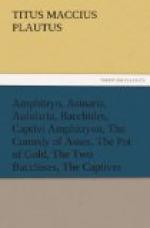DRAMATIS PERSONAE
ERGASILVS PARASITUS
HEGIO SENEX
LORARIVS
PHILOCRATES ADULESCENS
TYNDARVS SERVUS
ARISTOPHONTES ADULESCENS
PVER
PHILOPOLEMVS ADULESCENS
STALAGMVS SERVUS
ERGASILUS, a
parasite.
HEGIO, an old
gentleman.
SLAVE OVERSEER,
belonging to Hegio.
PHILOCRATES, a
young Elean captive.
TYNDARUS, his
slave, captured with him.
ARISTOPHONTES,
a young Elean captive.
A PAGE, in
the service of Hegio.
PHILOPOLEMUS,
Hegio’s son.
STALAGMUS, Hegio’s
slave.
Scene:—A city
in Aetolia. A street on which stands Hegio’s
house.
PROLOGVS
PROLOGUE
Tyndarus AND Philocrates
ARE CHAINED, IN AN
UNCOMFORTABLE POSITION, TO
A PILLAR IN FRONT OF
Hegio’s HOUSE
Hos quos videtis stare his captives duos, illi qui astant,[1] hi stant ambo, non sedent; hoc vos mihi testes estis me verum loqui. senex qui his habitat Hegio est huius pater.
These two prisoners you see standing here, well, both of those bystanders are men who are—standing, not sitting down. (Prologue laughs uproariously at his pleasantry) I leave it to you if so much is not true. The old man that lives yonder—(pointing to Hegio’s house) Hegio, by name— is this man’s (pointing to Tyndarus) father.
sed is quo pacto serviat suo sibi patri, id ego hic apud vos proloquar, si operam datis. seni huic fuerunt filii nati duo; alterum quadrimum puerum servos surpuit eumque hinc profugiens vendidit in Alide patri huius. iam hoc tenetis?[2] optume est. 10
But how it happens that he is the slave of his own father I shall (jauntily) here in your midst proclaim, with your kind attention. This old gentleman had two sons. One of them, when he was four years old, was stolen by a slave who took to his heels and sold the boy in Elis to the father of this worthy (pointing to Philocrates) here. Now you take me? Very good!
negat hercle ille ultimus. accedito. si non ubi sedeas locus est, est ubi ambules, quando histrionem cogis mendicarier. ego me tua causa, ne erres, non rupturus sum. vos qui potestis ope vestra censerier, accipite relicuom: alieno uti nil moror.
Bless my soul! That gentleman at the back says he does not. Let him step this way—. (no move in audience) In case there is no opportunity to take a seat, sir, you can take a (pointing to an exit) stroll, seeing you insist on making an actor turn beggar. I have no intention of bursting myself, merely to keep you from misunderstanding the plot. (to rest of audience) As for




